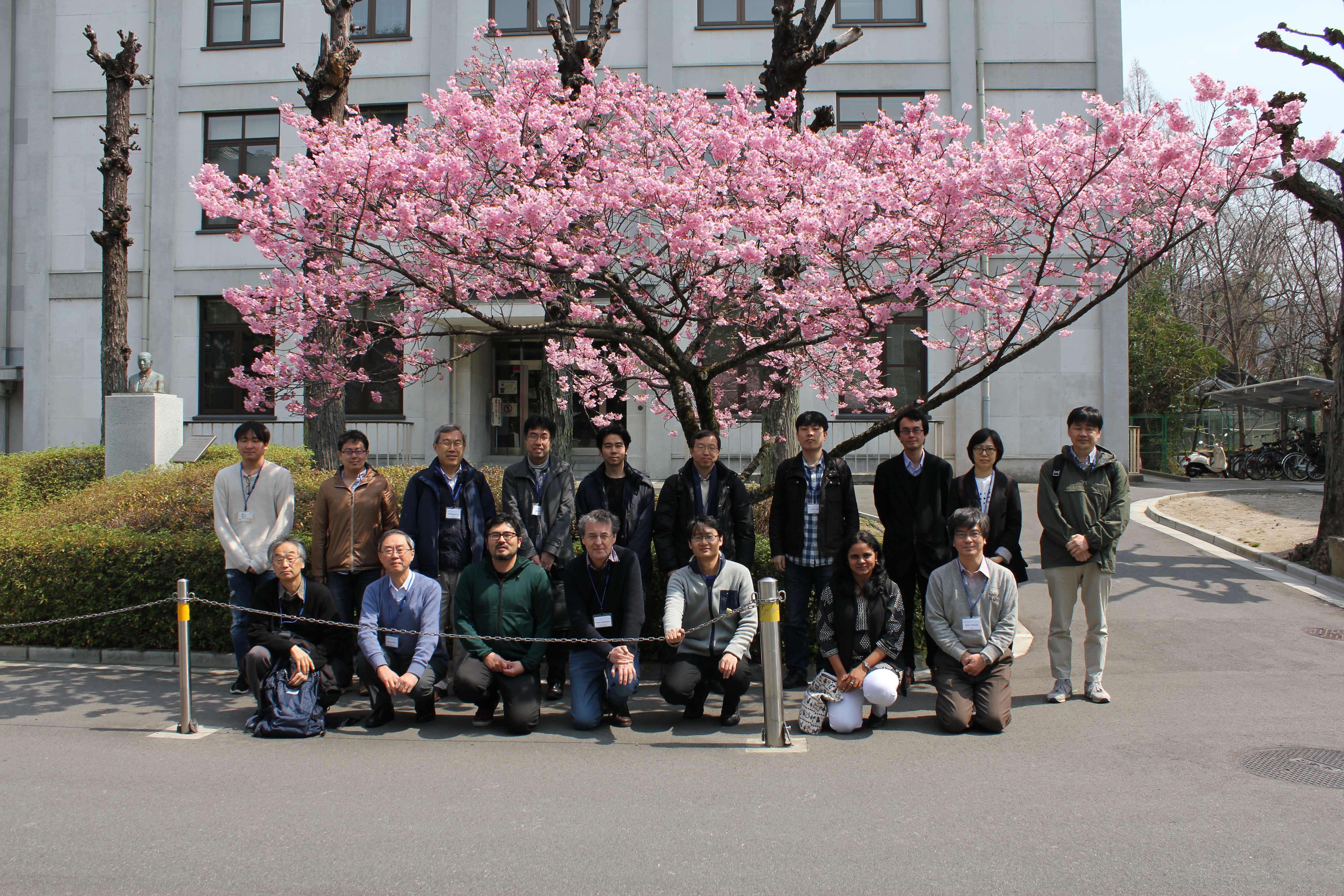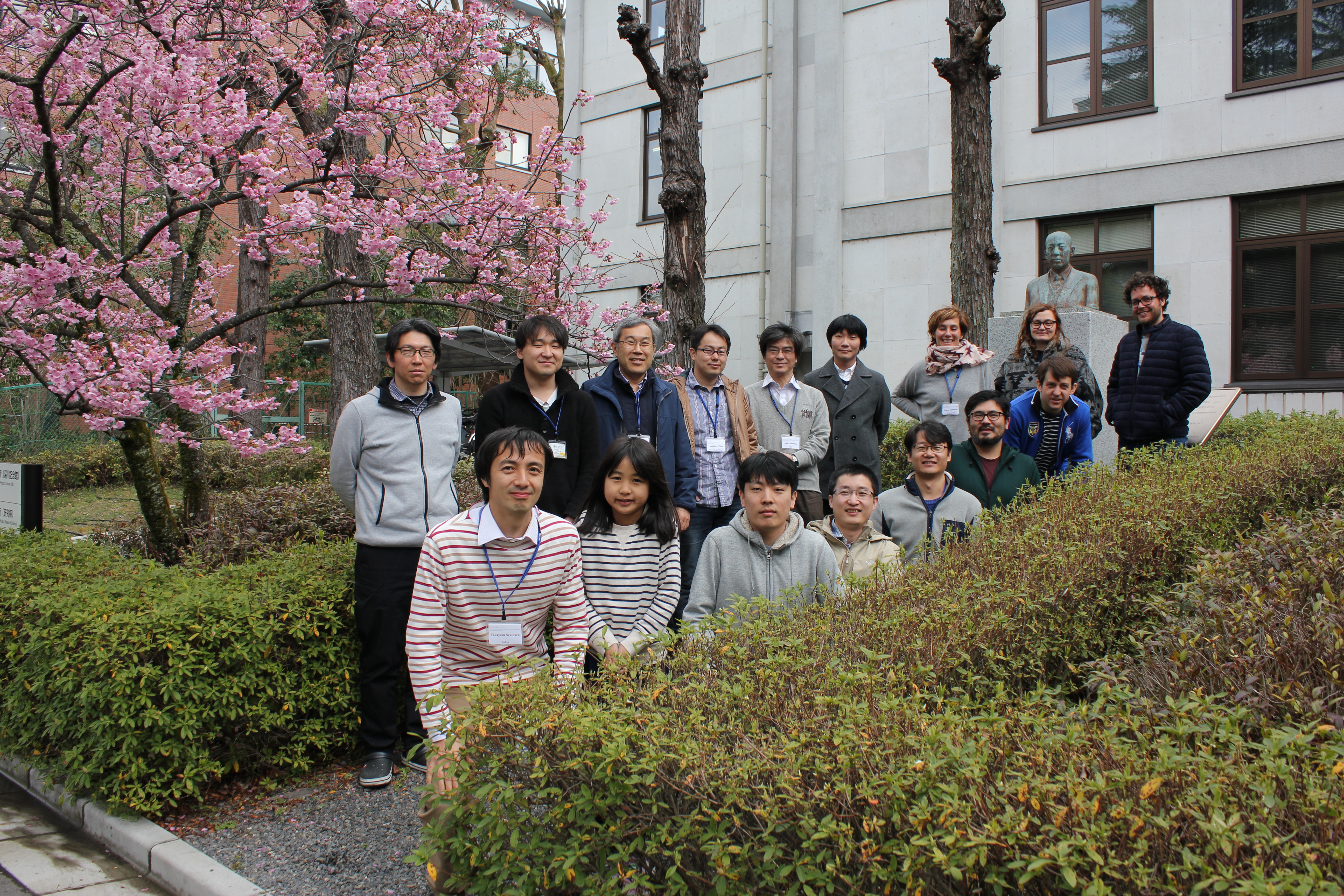| Hadron Interactions and Polarization from Lattice QCD, Quark Model, and Heavy Ion Collisions 2019-03-25 — 2019-04-05 |
Hadron Interactions and Polarization from Lattice QCD, Quark Model, and Heavy Ion Collisions
Aims and Scopes
In this molecule-type workshop, we discuss hadron interactions and polarization in high-energy collisions. Interaction between hadrons is a basic ingredient to describe hadron many-body systems including the hadronic molecule component of exotic hadrons. Another recent hot topic is the global polarization of the source, which is formed in high-energy heavy-ion collisions and emits polarized hadrons.
In recent years, hadron-hadron interactions have been obtained in ab initio approaches, the chiral effective field theories (chiral EFT) and the lattice QCD simulations. The baryon-baryon interaction from lattice QCD shows the nature similar to that from the quark model, e. g. the strength of the repulsive core qualitatively agrees with that from the Pauli blocking and color-spin interaction of quarks in the quark model baryon-baryon interaction. In recent experiments, two particle momentum correlation functions have been measured, and some of hadron-hadron interactions from chiral EFT and lattice QCD have been found to explain the data well. It would be interesting and valuable to revisit quark model hadron-hadron interactions in view of ab initio interactions and the two particle correlations.
Another interesting subject in recent heavy-ion physics is the existence of the vorticity and the magnetic field. The polarization of Λ particles can be measured by using the decay angle of pions, and it has been found that Λ and Λbar are really polarized in heavy-ion collisions. The polarization average and difference of Λ and Λbar suggest the existence of the vorticity and the magnetic field. Now it becomes possible to discuss their strength based on data. One can discuss the modification of hadron properties and hadron-hadron interactions in a polarized medium. For example, some exotic hadrons contains significant component of loosely bound hadronic molecules, then their properties would be modified with small perturbations such as the magnetic field.
In this workshop, researchers interested in hadron-hadron interactions and polarizations get together, review recent developments, work on things what we can do at present, and discuss possible directions of future studies. For this purpose, several experimentalists at RHIC and LHC will report recent results of two hadron correlations and polarizations. We also have reports on theoretical developments on hadron interactions from chiral EFT, lattice QCD, and the quark model. Developments in correlation functions and expected effects of magnetic field on hadrons will be also reported. In the later part of the workshop, we discuss and work on hadron interactions and polarizations.
Seminar schedule
Office allocations in Yukawa Hall
Access (YITP website)
Restaurants (YITP website)
*Seminars will be held in Panasonic Hall on the 1st floor in Yukawa Hall.
Confirmed Participants and talk slides
- Su Houng Lee (Yonsei) 3/25-4/5 [talk slides]
- Xu-Guang Huang (Fudan) 3/25-4/2 [talk slides]
- Johann Haidenbauer (FZ Juelich) 3/25-3/29 [talk slides]
- Laura Fabbietti (TUM, ALICE) 3/30-4/5 [talk slides]
- Neha Shah (IITP, STAR) 3/25-3/30 [talk slides]
- Takafumi Niida (Wayne State, STAR) 3/25-4/3 or 5 [talk slides]
- Makoto Oka (JAEA) 3/26-3/29 [talk slides]
- Philipp Gubler (JAEA) 4/1-4/5
- Kazunori Itakura (KEK) 3/25-3/28
- Hidetoshi Taya (Fudan) 3/25-4/5 [talk slides]
- Yuki Kamiya (YITP/ITP-CAS, Beijing) 3/25-4/5
- Di-Lun Yang (YITP) 3/25-3/29
- Tetsuo Hyodo (YITP) 3/27-3/29
- Akira Ohnishi (YITP) 3/25-4/5 [talk slides]
- Koichi Hattori (YITP) 3/25-4/5
- Oton Vázquez Doce (TUM) 3/31-4/5 [talk slides]
- Aaron Park (Yonsei) 3/25-4/4 [talk slides]
- Valentina Mantovani-Sarti (TUM) 3/30-4/5 [talk slides]
- Juhee Hong (Yonsei) 3/26-3/28 [talk slides]
- Akihiko Monnai (KEK) 3/25-3/28 [talk slides]
- Kenji Sasaki (YITP) 3/28-4/5 [talk slides]
- Sungtae Cho (Kangwon nat'l) 3/25-3/30 [talk slides]
- Teiji Kunihiro (YITP/RCNP)
- Takayasu Sekihara (JAEA)
Group photo
[1st week (1, 2, 3, 4)] [2nd week (1, 2, 3, 4, 5)]
